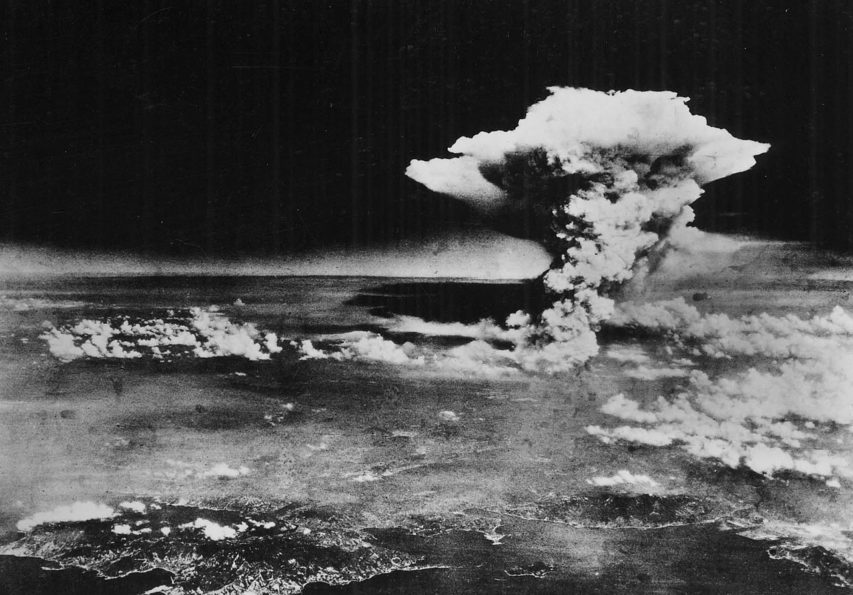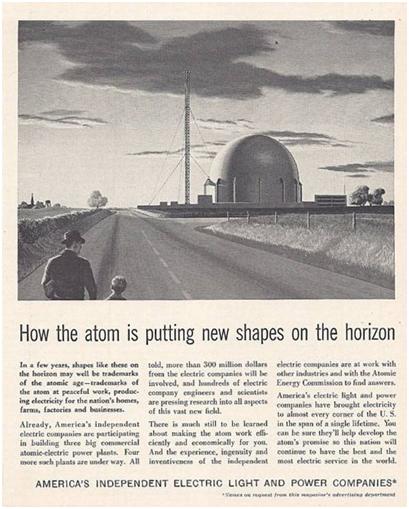Extra Credits
Published on 25 May 2019At stake on the English side was trade, the English role in Christendom, the king’s lands in France held by right for 150 years, and the reputation and honor of the king. On the French side, a unified country, national prestige, and the right of their monarch to his own throne.
Thanks again to David Crowther for writing AND narrating this series! https://thehistoryofengland.co.uk/pod…
Join us on Patreon! http://bit.ly/EHPatreon
May 26, 2019
History of England – The 100 Years War – Extra History – #1
Our nuclear epoch
In Quillette, Michael Shellenberger outlines the discussion about the advent of nuclear energy marking a new age:

Atomic cloud over Hiroshima, taken from “Enola Gay” flying over Matsuyama, Shikoku, 6 August, 1945.
US Army Air Force photo via Wikimedia Commons.
The age of humans may soon be known as the age of nuclear.
For two decades, scientists have debated whether we are living in a new geological epoch. They appear to have decided that we are and that the invention of nuclear energy should mark its beginning.
Twenty-nine of the 34 members of the Anthropocene Working Group (AWG) voted this week to declare the invention and testing of nuclear weapons as the beginning of the Anthropocene or geological age of humans. The two other main contenders for demarcating the start of the epoch were the rise of agriculture, which radically altered landscapes, and the birth of the industrial revolution, which has accelerated climate change.
The 1945 explosion of nuclear weapons at Hiroshima and Nagasaki, and the radioactive fallout from outdoor nuclear weapons testing, which continued until 1963, is physically embedded in glacial ice and earth sedimentation. Advocates for the invention of nuclear as the best way to mark the beginning of the human age note that, unlike anything done by hunter-gatherers, agriculturalists, or industrialists, nuclear activity leaves a human trace in the geology of Earth. “It is distinguishable,” argues Zalasiewicz. “It is distinctive.”
In their decision, the AWG scientists are implicitly recognizing that nuclear energy is a permanent feature of human civilization, like fire, agriculture, and gunpowder. As such, the decision by scientists to recognize nuclear as a revolutionary technology could help humankind to finally accept the technology along with its potential to lift all humans out of poverty, protect the natural environment, and end war as we know it.
The Allied Clusterf**k in France – WW2 – 039 – May 25 1940
World War Two
Published on 25 May 2019While the massive invasion of the Benelux countries and France was going down last week, things were also developing on the fronts in Norway and China. But this week, the German beast is let loose. After breaking through its cage at Sedan last week, nothing seems strong enough to block its way to the English Channel. And if one thing becomes clear, it is that the Allied command structure and the way they communicate is one big smoking mess…
Join us on Patreon: https://www.patreon.com/TimeGhostHistory
Or join The TimeGhost Army directly at: https://timeghost.tvFollow WW2 day by day on Instagram @World_war_two_realtime https://www.instagram.com/world_war_t…
Join our Discord Server: https://discord.gg/D6D2aYN.
Between 2 Wars: https://www.youtube.com/playlist?list…
Source list: http://bit.ly/WW2sourcesWritten and Hosted by: Indy Neidell
Produced and Directed by: Spartacus Olsson and Astrid Deinhard
Executive Producers: Bodo Rittenauer, Astrid Deinhard, Indy Neidell, Spartacus Olsson
Creative Producer: Joram Appel
Post-Production Director: Wieke Kapteijns
Research by: Indy Neidell
Edited by: Iryna Dulka
Map animations: EastoryColorisations by Joram Appel, Spartacus Olsson and Norman Stewart.
Eastory’s channel: https://www.youtube.com/channel/UCEly…
Archive by Screenocean/Reuters https://www.screenocean.com.Sources:
FDR Presidential Library & Museum
National Portrait Gallery
IWM: H 9218, F 4484, F 4613, F 4578, F 4743б (F 4339
MUSÉE DES ETOILES
Nationaal Archief
Sound effect: LittleRobotSoundFactoryA TimeGhost chronological documentary produced by OnLion Entertainment GmbH.
HBO’s Chernobyl reviewed by Slava Malamud
Colby Cosh linked to Slava Malamud’s thread, rolled up here courtesy of Thread reader:
Game of Theories: The Austrians
Marginal Revolution University
Published on 28 Nov 2017Austrian business cycle theorists argue that the central bank could be distorting market signals for entrepreneurs. How does this contribute to booms and busts?
QotD: Maurice Sendak on childhood
We’ll begin our tribute to Maurice Sendak with an excerpt of our 1986 interview, in which he told me that when he was a child, adults looked big and grotesque to him, and he couldn’t imagine ever becoming one.
MAURICE SENDAK: It was inconceivable to me as a child that I would be an adult. I mean, one assumed that it would happen, but obviously it didn’t happen, or if it did, it happened when your back was turned, and then suddenly you were there. So I couldn’t have thought about it much.
TERRY GROSS: Because adults seemed really big and different, you couldn’t imagine becoming one?
SENDAK: And awful. Yeah. I mean they were mostly dreadful, and if the option were to become an adult was to become another dreadful creature, then best not, although I think there had to be a kind of normal anticipation of that moment happening because being a child was even worse.
I mean, being a child was being a child — was being a creature without power, without pocket money, without escape routes of any kind. So I didn’t want to be a child.
I remember how much — when I was a small boy I was taken to see a version of Peter Pan. I detested it. I mean the sentimental idea that anybody would want to remain a boy, I don’t — I couldn’t have thought it out then, but I did later, certainly, that this was a conceit that could only occur in the mind of a very sentimental writer, that any child would want to remain in childhood. It’s not possible. The wish is to get out.
“‘Fresh Air’ Remembers Author Maurice Sendak”, NPR Books, 2012-05-08.




